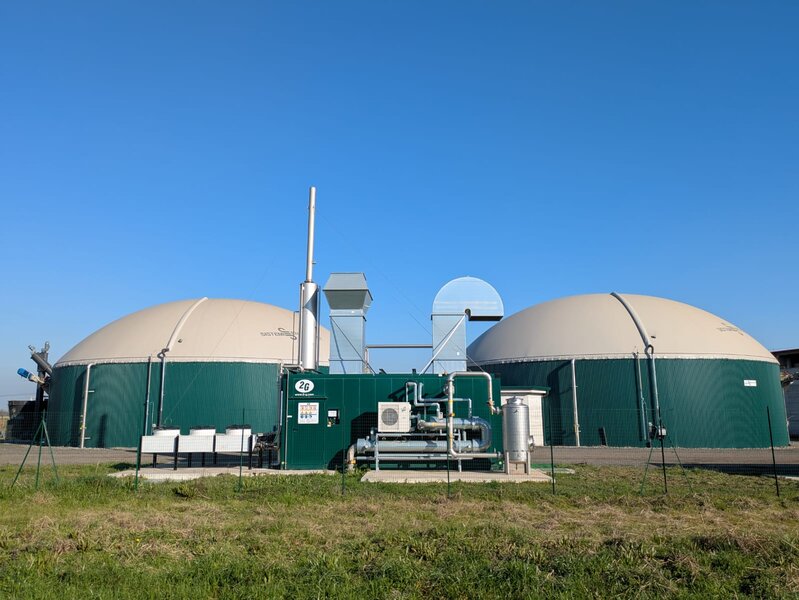An agricultural synergy that generates energy
Two farms in the Italian region of Lombardy join forces to turn manure into a usable resource
Facts & figures

Società Agricola Belloni GEA and Azienda Agricola Cascina Grande di Boccardi are two historic farms from the Italian region of Lombardy. Both have been active in livestock farming for several generations. The first farm is certified for the production of Grana Padano and takes care of milking and lactation, while the second farm specializes in rearing heifers to ensure the offspring for the main herd.
In 2021, through a partnership, they decided to create the Consorzio Energia Grande e G.E.A. to pool skills, resources and infrastructure and face a common challenge: the efficient and sustainable management of animal waste.
Two specific objectives were pursued:
1. streamlining processes, reducing environmental impact and the use of chemical fertilizers
2. to diversify sources of income in an increasingly challenging agricultural environment
"In certain market phases, milk alone was no longer sufficient to cover production costs and investments. Diversification was an imperative decision in order to continue growing," explains Giovanni Pennè, member of the consortium and legal representative of Cascina Grande.
The solution found was to build a combined heat and power plant that runs exclusively on biogas from livestock manure. In order to take advantage of the incentives provided, the two companies merged their respective wastewater production at a single site, which is located in the immediate vicinity of the company's facilities, so that no transportation to the other sites is required. The entire plant was designed and built by Sistemi Energetici S.p.A., a partner of 2G Italia, which also handled the technical and logistical management of the wastewater. The automated system, which can be controlled remotely, includes collection and dispatch pre-tanks, agitators and pumps connected to advanced software. The wastewater is transported to the digestion plant via an underground pipeline network, eliminating the need for transportation by agricultural vehicles and allowing for more efficient and continuous management without the need for dedicated personnel to carry out manual operations.
The heart of the project is an agenitor 408 supplied by 2G Italia, which guarantees a high electrical efficiency of 41.5% and has been operating reliably for over a year and a half. Almost all of the electricity generated is fed into the grid, with a self-consumption of 6 to 8 % required for the operation of the system itself (pumps, mixers, control software). From a thermal point of view, the heat recovery was a particularly positive surprise, which is the result of careful planning.
The hot water produced by the system is used for various operational purposes:
- Maintaining fermenter temperatures (approx. 48 - 49 °C) and covered storage
- Washing the milking systems and milk tanks, ensuring a water temperature of 70 °C
- Milk preparation for calves
- Thermoregulated drinking for lactating cows
"Heat recovery has exceeded our expectations. We have almost completely dispensed with gas for heating the water in the barn, which is an immediate economic and qualitative advantage," emphasizes Pennè.
In the near future, the hot water will also be used to heat the company buildings, for which the connections are already in place. Another important result is the agricultural utilization of the fermentation residues, which are separated into a liquid and a solid component: The former is also used to dilute the incoming wastewater, the latter for fertilization, which reduces the nitrogen content.
The economic viability of the investment is guaranteed by the feed-in tariff of around 1,500 euros per day. A figure that allows the consortium to foresee amortization in 12 years and also to support new investments for the modernization of the plants.
The choice of 2G Italia as the supplier of the CHP engine was the result of a careful and transparent selection process. In addition to the reliability of the technical solutions, the human and professional relationship with the sales and technical team, the contractual flexibility and the efficiency of the after-sales service also played an important role.
"We looked at several installations before making our decision. With 2G Italia we found competence, transparency and punctuality. The support is always quick and precise, without us having to be reminded. We can only recommend this partner," concludes Pennè.
The case of Consorzio Energia Grande e G.E.A. today represents a concrete example of the circular economy in the livestock sector, where the synergy between business, technology and strategic vision has produced a replicable and successful model that combines sustainability, efficiency and economic autonomy.





